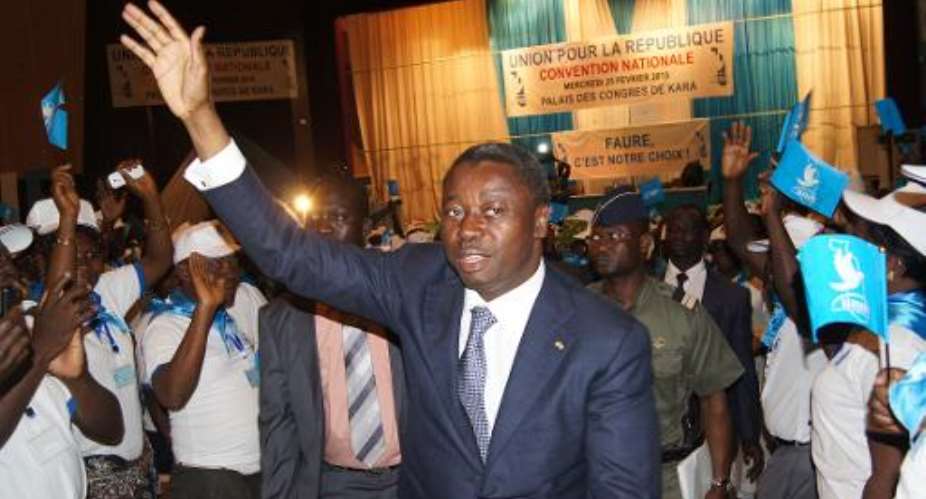Lome (AFP) - Togo, governed by Gnassingbe Eyadema with an iron grip for 38 years, is today led by his son, Faure Gnassingbe, who in 2005 and 2010 won disputed presidential elections.
A factfile on the west African country of 6.8 million people:
- History -
A former German colony, Togo was conquered by Anglo-French forces at the start of World War I in 1914, then divided in two in 1922. British Togoland in the west was smaller than eastern French Togoland. Both were under mandates exercised on behalf of the United Nations from 1946.
In 1956, British Togoland joined what the following year was to become the independent state of Ghana, the former Gold Coast. The remainder became independent Togo in 1960.
Togo's first president, Sylvanus Olympio, was killed in a coup in 1963 led by an army colonel then known as Etienne Eyadema, who later adopted the name Gnassingbe Eyadema.
Nicolas Grunitsky, who succeeded Olympio, was ousted in a bloodless coup in 1967 by Eyadema, who proclaimed himself head of state.
- 48 years of dynasty -
Several hundred people lost their lives in political and social unrest in the early 1990s.
Pressure for democracy and donor threats to stop economic assistance led to a national conference in 1991 and a transitional administration with a lifting of restrictions on the political opposition.
With military backing, Eyadema soon reclaimed his presidential authority. He was re-elected in 1993, in a poll boycotted by the opposition. Eyadema was returned to power in 1998 in an election whose results were contested by his opponents, and again in 2003 after modifying the constitution to allow him to seek another term.
The day after Eyadema's death in February 2005, his son Faure Gnassingbe was named by the army to succeed him, before standing down under international pressure. He was elected in April 2005 during a vote disputed by the opposition and tainted by violence. He was re-elected in March 2010 faced with opposition leader Jean-Pierre Fabre.
- 2015 presidential election -
Faure is seeking a third term in office on April 25, while his challenger Fabre of the main opposition Combat for Political Change (CAP) coalition is seeking to end nearly 50 years of rule of the Gnassingbe dynasty.
- The economy -
The economy has made a timid recovery since the return of donors in late 2007. Togo's main partners, notably the European Union, suspended cooperation with Togo in 1993. The resumption of cooperation by the EU in late 2007, in return for the regime's efforts on human rights, led other bilateral partners, including China, the World Bank and the International Monetary Fund to renew ties with Lome.
Togo is a large producer of phosphate, but the sector has been hindered by corruption and bad management.





 'Kill whoever will rig Ejisu by-election' – Independent Candidate supporters inv...
'Kill whoever will rig Ejisu by-election' – Independent Candidate supporters inv...
 Ashanti Region: ‘Apologize to me for claiming I owe electricity bills else... – ...
Ashanti Region: ‘Apologize to me for claiming I owe electricity bills else... – ...
 Ghana is a mess; citizens will stand for their party even if they’re dying — Kof...
Ghana is a mess; citizens will stand for their party even if they’re dying — Kof...
 Internet shutdown an abuse of human rights — CSOs to gov't
Internet shutdown an abuse of human rights — CSOs to gov't
 Free SHS policy: Eating Tom Brown in the morning, afternoon, evening will be a t...
Free SHS policy: Eating Tom Brown in the morning, afternoon, evening will be a t...
 Dumsor: A British energy expert 'lied' Ghanaians, causing us to abandon energy p...
Dumsor: A British energy expert 'lied' Ghanaians, causing us to abandon energy p...
 What a speech! — Imani Africa boss reacts to Prof. Opoku Agyemang’s presentation
What a speech! — Imani Africa boss reacts to Prof. Opoku Agyemang’s presentation
 Dumsor: Tell us the truth — Atik Mohammed to ECG
Dumsor: Tell us the truth — Atik Mohammed to ECG
 Dumsor: Don't rush to demand timetable; the problem may be temporary — Atik Moha...
Dumsor: Don't rush to demand timetable; the problem may be temporary — Atik Moha...
 Space X Starlink’s satellite broadband approved in Ghana — NCA
Space X Starlink’s satellite broadband approved in Ghana — NCA
